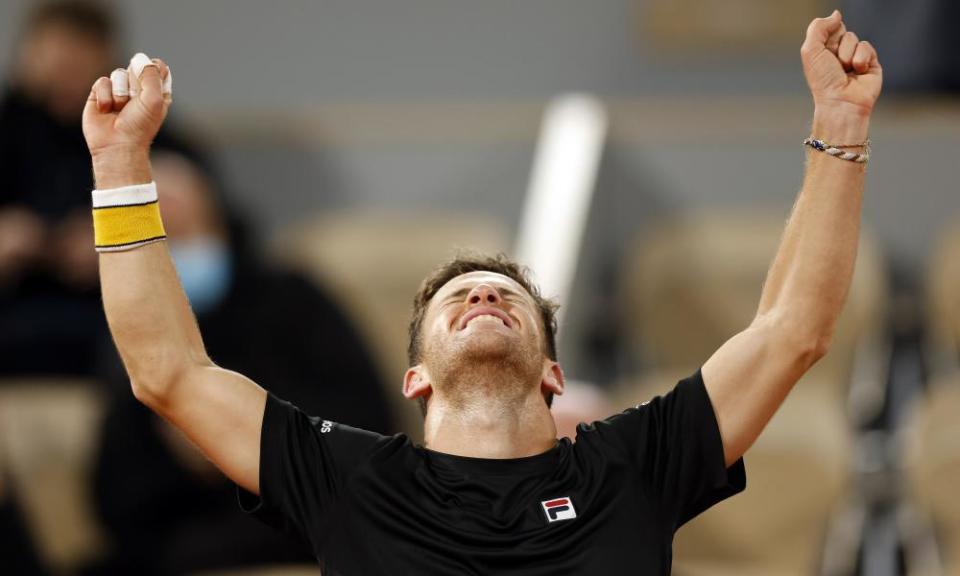Diego Schwartzman topples Dominic Thiem in French Open epic

By the time Dominic Thiem and Diego Schwartzman had stopped hogging Court Philippe Chatrier, night had fallen on Paris yet two matches were still to be played. To the 750 fans present, it didn’t matter. They were proud witnesses to a five-hour psychodrama as Schwartzman eventually recovered to reach his first grand slam semi-final with a 7-6(1), 5-7, 6-7(6), 7-6(5) win against the US Open champion Thiem at Roland Garros in 5hr 8min.
Schwartzman arrived on Chatrier all too aware of the opportunity at hand. While his momentum has been steadily building since he beat Rafael Nadal in Rome en route to his first Masters 1000 final, it has been clear for a while that the effort it took Thiem to win his first grand slam title last month would eventually catch up with him.
Related: French Open women's doubles match under investigation for match-fixing
But even with his tank nearing empty, Thiem’s spirit was majestic. In a match filled with nerves and endless exchanges, so often Thiem looked dead on his feet before roaring back to life. Schwartzman led 5-4 and 15-30 on Thiem’s serve in the second set before one of the worst misses of his career, then he failed to convert 5-3 leads in the third and fourth sets. As he felt the chances slipping away, he raged to his team.
“In the second set and the third set I was out of my mind,” he said, laughing. “I don’t know what the people are thinking about me in that time but I was crazy, screaming, talking to my coach. My coach was saying: ‘OK, play tennis, nothing else.’ I was so nervous because I saw the chance today and I didn’t take it in the second and in the third.”
Schwartzman did not take his chances, but what defines him is the nerve he had to constantly pursue another. Two points away from defeat at 5-5 in the fourth-set tie-break, Schwartzman cracked a forehand on to the baseline and delicately placed a drop-volley winner. He took the tie-break and eventually the match.
“We are friends,” said Schwartzman. “I have a lot of respect for him and that’s why this match is very, very important for me. Not just to play a good match, winning after five hours in Philippe Chatrier, first time. I’ve played few times five sets here and I never win. I think at the end, this night, I deserve to win. Come on.”
It concluded one of the great nights in years for Argentinian tennis after the world No 131 Nadia Podoroska shocked the No 3 seed Elina Svitolina 6-2, 6-4 to reach the semi-finals on her debut. She will face Iga Swiatek or the qualifier Martina Trevisan for a place in the final, marking just the second time since 1983 that two unseeded female players will compete in a grand slam semi-final.
Related: French Open 2020: Schwartzman v Thiem goes into a fifth set – live!
This was already a Roland Garros for the little person, a two-week affirmation of the quality of competition away from the top of the men’s and women’s tours. In Podoroska’s case, her success is the simple consequence of establishing the habit of winning, no matter where those wins occurred. After languishing outside the top 300 last year, this year she has compiled a 43-6 win-loss record from runs first at tournaments with only $25,000 prize money, and now with victories at the elite level of the sport.
The 23-year-old later provided some sobering context to her success as she thought back to 2017, when she did not know if she would be able to continue her tennis career: “I had too many injuries,” she said. “I dropped my ranking. I had been like eight months out of the Tour. Then I didn’t have money to start playing tournaments. It was a very tough moment for me because I also changed all my team … I was a little bit, like, I didn’t know what to do.”
After winning a total of £232,604 prize money in her entire career, Podoroska has earned £386,862 for three weeks of work. Reaching a Roland Garros semi-final is a personal dream and as the first Argentinian woman since Paola Suárez in 2004 to do so, a country still nostalgic for the days of Gabriela Sabatini, it brings hope of a revival for South American women’s tennis. However, lower-ranked players have other priorities. Most of all, it will ensure that she can afford to conduct her career under the best possible conditions for the foreseeable future.

 Yahoo Sport
Yahoo Sport 





































